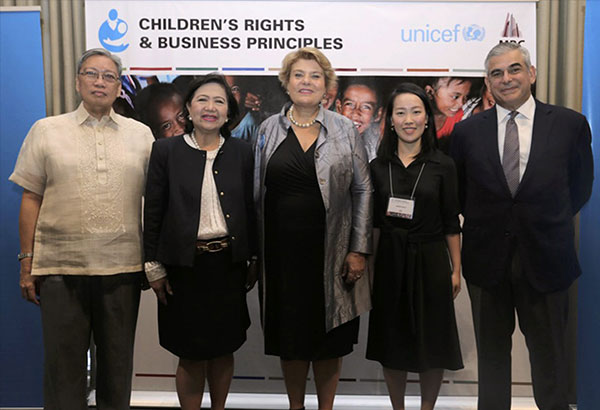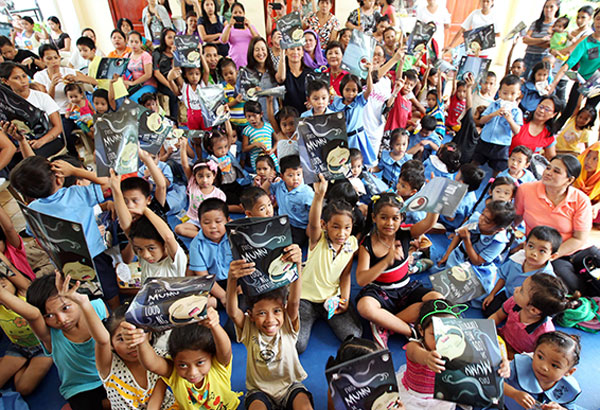Championing children’s rights the Ayala way

Business leaders unite for the Philippine launch of UNICEF’s Children’s Rights and Business Principles. With UNICEF Philippines Representative Lotta Sylwander (center) are (from left) Makati Business Club president Edgar Chua, SM Supermalls president Annie Garcia, Hennes & Mauritz Asia Regional Sustainability manager for Asia Wong Xin Yi and Ayala Group of Companies chairman and chief executive officer Jaime Augusto Zobel de Ayala.
MANILA, Philippines - You reap what you sow. It’s as simple as that for the Ayala Group, the oldest and one of the country’s largest conglomerates.
Understanding fully well the importance of children in the society and the vital role they play in nation building, the group has been championing children development and rights protection for many years now.
But having done so does not stop the conglomerate from making more effort to pursue its advocacy, according Ayala Group chairman and chief executive officer Jaime Augusto Zobel de Ayala.
For Zobel, businesses have tremendous capacity and responsibility to effect positive change in society, including children.
“Businesses cannot operate in a vacuum, without thinking of social concerns. We are asked today to evolve in our way of thinking, and integrate social issues into business strategy,” Zobel said.
“Putting children’s rights at the heart of our businesses builds trust with the market, ensures brand strength and makes us relevant to society in the long-term. Given the breadth and depth of our reach and the massive resources at our disposal, we have enormous potential to impact the rights of children. It is our duty to make sure that the impact we have is positive,” Zobel said.

Zobel said the Ayala Group, which has presence in a wide range of sectors that include banking, real estate, telecommunications, energy, water, industrial technologies, healthcare and education, has a longstanding commitment to create shared value for all its stakeholders, thereby allowing it to integrate children’s rights and welfare into its various business models
He said Manila Water, for one, has a special program meant specifically to benefit low-income families.
“In the early stages of our business, we found that low-income communities had great difficulty in accessing clean water. To alleviate this problem, we came up with Tubig Para sa Barangay. Its sustainable business model of collective installation and billing allowed multiple households to share the benefits and the responsibility of a consistent water supply. For only P80 a month, a family has 24/7 access to clean, potable water, while more of its income is freed up for other needs,” he said.
For its real estate business, Ayala Land, Zobel said the welfare of children and families are of utmost consideration in the designs of its projects.
“One of the most important considerations is pedestrian safety, with designated walkways and bike lanes, as well as open, green space and parks. While these green spaces serve an ecological and sustainability purpose, they also ensure a family and child-friendly environment for outdoor activities,” Zobel said.
Ayala’s telecom unit, Globe, meanwhile, has a strong working relationship with the United Nations Children’s Fund (UNICEF) Philippines.
Zobel said Globe has been working with UNICEF and government agencies against online child sexual abuse through educating students, parents, caregivers, and teachers on cyber security and safety, as well as online etiquette.
“In education, the Affordable Private Education Center (APEC) secondary schools have over 10,000 students learning from a special curriculum that enhances employability of students. Tuition fees are among the most affordable in the greater Manila area, at only P22,500 for the entire schoolyear. Low-income families can enroll their children in APEC through the DepEd’s voucher program, which allows students to claim a deduction from the cost of tuition. For students who can apply the full amount of the voucher, APEC tuition for an entire school-year costs only P10,000 – or P27 a day,” he said.
These different programs, Zobel said, are meant to help empower Filipino youth to become change agents of the society.
But things will not stop there as far as Ayala Group is concerned, the business leader promised.
“At Ayala, while our sustainability framework already accounts for this commitment to a certain extent, we want to take things a step further,” he said.
Among the initiatives the group is considering according to Zobel is the development of a framework through which it can undertake impact assessments to determine how its various businesses affect the lives of children and families.
“We are also looking at the possibility of undergoing training on the CRBP (Children’s Rights and Business Principles), including more comprehensive and transparent reporting on what we do to uphold children’s rights. This dovetails perfectly with our recent shift to integrated reporting, which goes beyond financial results to also capture the broader impact we have on society, the environment, and the economy,” Zobel said.
The CRBP, which was launched by UNICEF Philippines last June 14, is the country’s first comprehensive set of principles to guide the private sector companies in the full range of actions they can take in the workplace, marketplace, and community to respect and support children’s rights.
“I believe this commitment has always been exhibited, in one way or another, by Filipino businesses. There is a widespread opposition to child labor, and an ongoing drive to ensure that it is abolished throughout our supply chains. At the same time, the launch of the CRBP emphasizes that there needs to be an evolution in the way we view our responsibility to children,” Zobel said.
UNICEF Philippines representative Lotta Sylwander said the level of children’s rights protection in the Philippines remains low considering that the official figure of child labor in the country is quite high.
It is for this reason that UNICEF Philippines is calling on the local business community, through the CRBP, for support in respecting and strengthening children’s rights protection across the country.
“Because children under the age of 18 account for almost a third of the world’s population, it is inevitable that businesses, whether small or large, will have an effect on the lives of children, both directly and indirectly. Children are affected by business in a variety of ways – as consumers, as members of employees’ families, as future employees themselves and as eventual business leaders. They also live in the communities and share the environments in which businesses operate,” Sylwander said.
- Latest






























